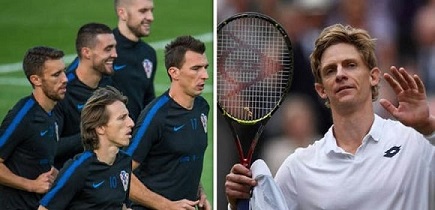The Finals Sunday
July 17, 2018 | Expert Insights

France won the World Cup 2018 final in a thrilling match against Croatia, who reached the finals for the first time in history, on 16 July.
On the same day, in a meteoric return to Wimbledon, Novak Djokovic of Serbia beat Kevin Anderson, the first South African to reach the finals after 97 years, for the title; while German Angelique Kerber won the Women’s singles over US player Serena Williams.
Background
The Fédération Internationale de Football Association is an international governing body of association football, futsal, and beach soccer. They are responsible for the organization of football's major international tournaments, notably the World Cup, which commenced in 1930 and the Women's World Cup, which commenced in 1991.
The need for a single body to oversee association football became apparent at the beginning of the 20th century with the increasing popularity of international fixtures. FIFA was established in Paris on 21 May 1904. The founding members were the national associations of Belgium, Denmark, France, the Netherlands, Spain, Sweden and Switzerland. Membership of FIFA expanded beyond Europe with the application of South Africa, Argentina, Canada, Chile, and the United States.
During World War II, FIFA struggled to keep itself afloat, and it had no financial or personnel resources with which to plan a peacetime tournament for when hostilities ended. The UK withdrew in 1920 as they refused to play against enemy countries. Competition resumed with the 1950 World Cup in Brazil, where the UK rejoined and lost to the US, but Eastern European countries withdrew.
The 1966 World Cup, hosted by England, was the first to embrace marketing, featuring a mascot and official logo for the first time. The trophy was stolen in the run-up to the tournament but was found a week later by a dog named “Pickles.” South Africa was banned for violating the anti-discrimination charter.
Russian President Vladimir Putin directed his sports ministry to submit a bid in 2009 which they won the next year to host the 2018 matches.
Analysis
Russia hosted the 2018 FIFA World Cup in 14 stadiums for an astounding $14 billion, well over the official cost of $10 billion. Transport infrastructure, stadium expansion and accommodation were the most expensive bills for the global sporting event. Over half of official costs fall on the federal budget. Since Russia won the hosting bid in 2010, the official budget for the tournament has been amended 12 times.
"A couple of years ago, I said this would be the best World Cup ever. Today, I can say that with new conviction. It is the best World Cup ever," FIFA President Gianni Infantino told a news conference in Moscow.
It wasn’t always hailed as the best World Cup as many called it the ‘World Cup of Shame’ or ‘Putin’s Cup’. Russia’s offensive in Crimea and Ukraine, and the alleged rigging of the US presidential elections, tainted the host’s hopes for a successful world cup. The US refused to attend for the first time in 28 years. Moreover, Russia’s Winter Olympics cemented negative perceptions as many of the host nation’s athletes were charged with drug use. Yet, the spirit of sportsmanship and thrill of competition electrified all the matches for fans across the world, who seldom allow politics to intervene with sport enthusiasm.
For the Russians, on the one hand, the influx of fans from across the world encouraged local industries and boosted morale for an inclusive Russia. On the other hand, the air was rife with racism and nationalism as women were shamed for fraternising with non-Russians, particularly Latin Americans and Africans.
Nevertheless, the general consensus is that Russia was successful and hundreds of thousands of foreigners are leaving with positive impressions of the country. Syria and Skripal were replaced by heartwarming tales of the foreigners’ free metro travel and visa-free travel. Incidents of Japanese courtesy cleaning up litter in the stadium, Swedes supporting a disabled Mexican fan, the Senegalese warm-up dance and a commendable lack of violence on field proves the influence of sports on humanity even in the chilly Russian air.
“Russians came together not for Crimea, or for Putin, but for an idea of being with everyone – of being with the losing Spaniards, and the victorious Croats, and being for everything that is good, including the ability to be nice with other people,” said cultural commentator Yuri Saprykin. The World Cup has been the first good-news Russia story since Perestroika, said another commentator. However, Tanya Lokshina of Human Rights Watch says the World Cup is a lost opportunity. She criticises football’s governing authorities for failing to use its leverage over the Kremlin.
As members of punk-rock band Pussy Riot ran onto the field after the final match in protest of Russia’s restrictions on free speech, is it possible that the window of success for Russia is short-lived?
Assessment
Our assessment is that the 2018 World Cup will go down in history as one of the greatest global sporting events. We believe that Russia can take advantage of the thaw in western perception by achieving a positive outcome for the world in the Helsinki talks. We feel that the spirit of sportsmanship will remain effervescent during social, economic and political turmoil, thus, acting as a source of hope for a more inclusive and cooperative world.








Comments